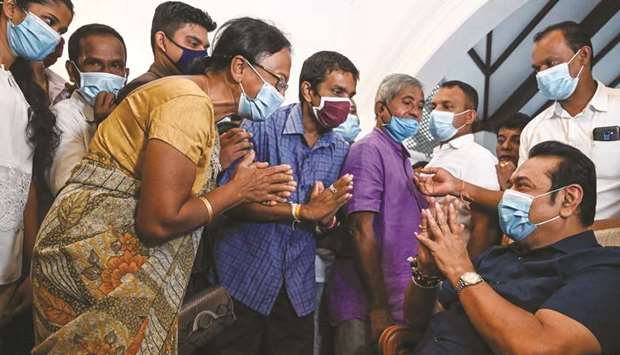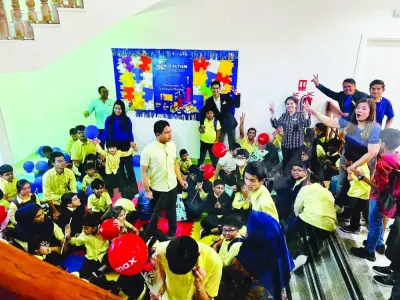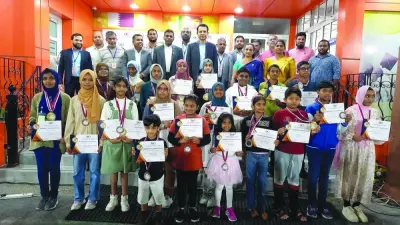Sri Lanka’s parliamentary elections handed President Gotabaya Rajapaksa and his older brother an overwhelming majority, results showed yesterday, giving the family power to enact sweeping changes to the constitution of the island nation.
Rajapaksa had sought, and achieved, a two-thirds majority for his Sri Lanka Podujana Peramuna party and its allies to be able to restore full executive powers to the presidency, a move analysts say could push the country toward authoritarianism.
The ruling group won 150 seats in the 225-member parliament, according to a tally published by the election commission from Wednesday’s vote. The two-thirds majority will see Rajapaksa’s brother and ex-president Mahinda Rajapaksa, 74, taking over as prime minister on Sunday as the tourism-dependent nation struggles to recover from last year’s deadly militant attacks and, more recently, lockdowns to control the coronavirus pandemic.
The brothers’ popularity has risen among the majority Sinhalese since the 2019 Easter Sunday attacks and because of their record in crushing Tamil separatist rebels in 2009.
President Rajapaksa, 71, said the restoration of full executive powers was necessary to implement his agenda to make the country of 21mn economically and militarily secure. No timeline has been set for such a move.
“We will ensure (Sri Lanka) will not stand disappointed during our tenure,” Mahinda Rajapaksa said on Twitter.
Currently, significant power is bestowed on parliament and the prime minister after a previous government led by the now- opposition amended the constitution and set up independent commissions to oversee the police and the judiciary, among other arms of the government.
“We have seen in the past when governments have had a two-thirds majority (they do) not have to worry about checks and balances,” historian and political scientist Jayadeva Uyangoda said. “In fact they have untrammelled power, that is what we have observed in both India and Sri Lanka. In the past in Sri Lanka, the governments which had this level of power in 1970 and thereafter in 1977 generated a lot of social discontent.”
Veteran journalist and political commentator Victor Ivan anticipates a power struggle between the brothers, who are known for stamping out the Tamil Tigers insurgency for a separate homeland for the Hindu minority during the elder Rajapaksa’s presidency in 2009, ending a 25-year civil war. “The president wants to change the constitution to take back the power to the presidency,” Ivan said.
“In this situation either the elder brother must step aside and cede power to the younger brother, or the younger man must take a step back and allow the older brother to exercise power.”
Sri Lanka’s economy contracted by 1.6% in the first quarter of 2020 as Covid-19 restrictions battered a country still recovering from last year’s Easter Sunday bomb attacks that killed 269 people and paralysed the tourism industry.
Capital Economics expects the Indian Ocean nation’s economy to shrink 4% this year, in what would be its worst performance in more than 50 years.
In a congratulatory phone call from Prime Minister Narendra Modi of India, which is keen to check Chinese influence on its southern neighbour, Mahinda Rajapaksa vowed to deepen relations between the neighbouring countries. “Sri Lanka and India are friends and relations,” the senior Rajapaksa, who had drawn his country closer to China during his presidency, said on Twitter after the call.
Sri Lanka in 2017 had to cede control of its southern port of Hambantota to its Chinese financiers after struggling to repay its debt for the project. Still, Capital Economics expects Rajapaksa’s election victory to add “impetus to the president’s plans to ‘restore relations’ with China”.
All in the family
Sri Lanka’s all-powerful Rajapaksa family has completed its bounce back to power by winning a two-thirds majority in parliamentary elections, final results showed yesterday. The powerful clan has held sway over the island nation’s politics for decades, as well as having a major influence in key state institutions such as the national airline and state corporations. Close relatives have also been appointed to top diplomatic posts abroad. Here are the key members of the dynasty:
‘The Patriarch’
Mahinda Rajapaksa, 74, is the patriarch of the family and served as prime minister in 2004 and then president from 2005 until January 2015. He was appointed prime minister a second time by his brother Gotabaya in November. Mahinda is adored by the Sinhala-Buddhist majority for crushing separatist Tamil rebels in May 2009 following a highly controversial military offensive that ended a decades-long civil war. During his rule Sri Lanka also moved closer to China, borrowing almost $7bn for infrastructure projects – many of which turned into white elephants mired in corruption.
‘The Terminator’
Gotabaya Rajapaksa, 71, was the main lieutenant of Mahinda during his reign, holding the influential post of secretary to the ministry of defence with responsibility for day-to-day control of the armed forces and police. Dubbed “The Terminator” by his own family, he is feared by foes for his short temper. He has faced several corruption allegations, but his court cases have been frozen or withdrawn as he enjoys immunity after winning the presidency in 2019.
‘Mr. Ten Percent’
Basil Rajapaksa, 69, is a political strategist who managed the economy under Mahinda. He was called “Mr. Ten Percent” in a BBC interview in reference to commissions he allegedly took from government contracts. Subsequent administrations failed to prove any charges he siphoned off millions of dollars from state coffers, but he still faces several prosecutions for corruption and unexplained wealth. As a dual US-Sri Lankan citizen, he was prohibited from standing for elected office but is currently a senior adviser to the government.
‘The Bodyguard’
Chamal Rajapaksa, 77, was speaker of the Sri Lankan parliament when brother Mahinda was president and is also a former minister of shipping and aviation. Formerly a police officer, he once served as a personal bodyguard to Sirimavo Bandaranaike, the world’s first woman prime minister. He is expected to continue to serve in the prime minister’s cabinet in the new government to be formed after the polls.
The Scion
Namal Rajapaksa, 34, a lawyer, is the scion of the family dynasty and the eldest son of Mahinda. He entered parliament in 2010 aged just 24. During his father’s decade in power, Namal was highly influential although he did not hold any portfolio. The former administration accused him of money laundering and other charges, for which he still faces trial. He is expected to play a key role in the new government, and observers say Mahinda is grooming him to become a future president.

Sri Lanka’s Prime Minister Mahinda Rajapaksa greets supporters at his home in the southern town of Tangalle yesterday.


